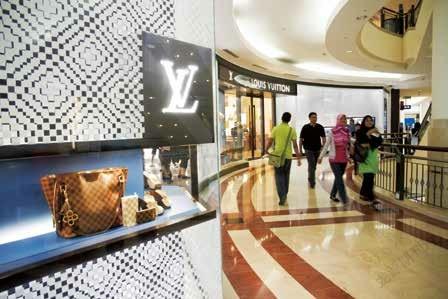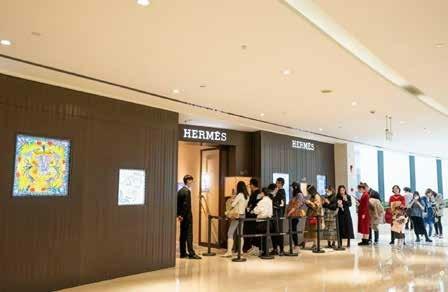Chinese High-Net-worth Individuals Have the Highest Confidence in the Future Economy of China
2021-11-26ByJoeZhang
By Joe Zhang
Not long ago, the Hurun Research Institute released the Hurun Chinese Luxury Consumer Survey 2021. According to the report, Chinese highnet-worth individuals strengthened their confidence in Chinas economic future and also in the stock market and real estate market in the past year, with more of them being involved in investment and having financial consultants, while the fewest of them on record are considering immigration. Moreover, they would first increase expenditures in health and healthcare since the COVID-19 pandemic.
Chairman and Chief Research Officer of Hurun Report, Rupert Hoogewerf, said: “Chinese high-end consumers are now obviously driving the global luxury industry, especially last year. The pandemic nearly stopped all outbound travel, resulting in significant growth in the mainland China high-end consumption market, in particular the traditional luxury market, which recorded a historical new high. Taking Louis Vuitton as an example, since the second quarter of last year, almost all leading international luxury brands have achieved a sales growth of more than 50% in mainland China. The high-end consumption market in mainland China currently contributes one-third of the global sales income, with the ratio being expected to reach 50% in five years time.”
“In 2020, Chinese high-net-worth individuals gave out 41% more presents. As the Spring Festival is approaching, it is expected that even more gifts will be given out. In terms of gifts under RMB 20,000, electronic products and alcoholic beverage are the most popular gifts for men given by Chinese high-networth individuals. Cosmetics, jewelry and accessories are the favorite gifts for women.”
“It can be seen from a survey regarding the most touching songs that Chinese high-net-worth individuals are more patriotic, with them voting the national anthem of the PRC, March of the Volunteers, and My Motherland and Me to be the most moving songs of 2020. The most popular choices were My Motherland and Me and I Love You, China in 2019, For the Rest of My Life (往后余生) and the Sound of Falling Snow(雪落下的聲音) in 2018, and Father, Chengdu and See You Again in 2017,”Rupert Hoogewerf added.
The Hurun Chinese Luxury Consumer Survey 2021 was the seventeenth annual report on the Chinese luxury consumption market issued by the Hurun Research Institute, and was aimed at revealing the lifestyle, consumption habits, and changes and preferences in brand perception of Chinese high-net-worth individuals, striving to describe the changes in their lifestyle.
This years report was based on a survey of 409 Chinese high-net-worth individuals with average total household assets of RMB 42 million, including 41 ultra-high-net-worth individuals with assets of more than RMB 100 million. Of the respondents, two thirds lived in first-tier cities, and were aged 37 on average; 49% were males, and 51% females; 35% were unmarried, and 58% were married (mostly forming one-child families); they owned four houses or apartments on average, with an average residential area of 220 square meters.
New trends in high-end consumption
The spending power of Chinese high-net-worth individuals in 2020 was not affected by the epidemic, with the average annual household consumption being a little higher than the previous year. The scale of Chinas high-end consumer market reached RMB 1.53 trillion.
According to the report, the size of Chinas high-end consumer market has now reached RMB 1.53 trillion, which is composed of RMB 420 billion from traditional luxury goods including highend clothing, shoes, hats, cosmetics, jewelry, luggage and watches, etc., (including local brands), RMB 670 billion from luxury vehicles, RMB 180 billion from high-end consumer electronics, RMB 110 billion from high-end tobacco, alcohol and tea products, RMB 100 billion from high-end home appliances and furniture, RMB 37 billion from high-end health care products, and RMB 9 billion from corporate aircrafts and yachts.
The average annual consumption of high-net-worth households accounts for 4.4% of their total assets, and 3.2% for ultra-high-net-worth households.
Of the surveyed Chinese high-networth individuals, the average annual household expenditure accounted for 4.4% of their total assets, marking an increase of 0.6 percentage points from the previous year; the average ratio of annual household expenditure to total assets for ultra-high-net-worth individuals with assets topping RMB 100 million was 3.2%, which was also up by 0.6 percentage points.
In the future, 46% of the respondents intend to increase expenditures in health and healthcare, followed by tourism (44%) and childrens education (43%). Personal education ranked fourth, and was more favored by respondents under 45, especially by women(accounting for more than half). Collections (23%) and daily luxuries (22%) ranked fifth and sixth.
Collections: 70% of high-networth individuals have collections, up by 42% from a year ago. Jewelry and jade (27%) became the most popular collections, topping wines and watches from leading brands, marking an increase of 9 percentage points from a year ago. Watches from leading brands(26%) continued to rank second, up by 5 percentage points. The rank of wines and liquors from leading brands (24%) came down to third place, despite the ratio increasing by 3 percentage points. Chinese calligraphy and paintings (24%) also ranked third, up by 8 percentage points. In addition, there were more individuals collecting classical furniture, western paintings and sculptures, and porcelain products, but the proportion of respondents having such collections was less than half that of the top three categories.
In next three years, it is expected that watches from leading brands (24%), Chinese paintings and calligraphy (21%), and wines from leading brands (20%) will be the top three most popular items to collect.
In the next three years, half of the respondents planned to have new cars, 42% wanted new watches, 38% responded with jewelry, 34% for apparel, and 31% for accessories. In terms of age, respondents under 30 had a higher desire for jewelry, clothing and accessories.
High-net-worth individuals with assets of at least RMB 10 million tend to own two cars (52% were considering buying electric cars within the next three years) and three watches on average. There was demand for corporate aircrafts for 23% of such respondents(17% chose chartered flights, with an average annual charter duration of 50 hours, while 6% chose to buy an aircraft). 75% of respondents drank alcoholic beverages, with red wine being the most popular, and sales of imported wines are increasing. The average consumer price for red wines was RMB 830, and RMB 1,950 for white liquor. 83% drink tea, with black tea being more favored than green tea. 46% stated that they were smokers.
The ultra-high-net-worth individuals with assets of at least RMB 100 million own four cars (44% were considering buying electric cars within the next three years) and five watches on average. 61% of such respondents needed corporate aircrafts (34% chose chartered flights, with an average annual charter duration of 65 hours; 27% chose to buy). 80% of respondents drank alcoholic beverages, with white liquor being the most popular. The average consumer price for white liquor was RMB 3,100, which is equivalent to the price of a 500 ml bottle of 53% (V/V) Kweichow Moutai, and RMB 1,060 for red wines. 92% drink tea, with green tea being the most popular. 59% are smokers.
When choosing gifts (with a value below RMB 20,000), Chinese highnet-worth individuals still favored electronic products the most, especially for male receivers, but their attractiveness is now a little weaker. Watches and red wines came after that. Accessories became more popular, and ranked fourth along with high-end white liquors. Meanwhile, cigarettes and cigars were recovering their popularity. In terms of age, respondents under 30 preferred accessories and clothing as gifts for men, while the top three most popular gifts for women were still cosmetics, jewelry and accessories. In addition, gift certificates were being chosen by much more respondents.
High-net-worth individuals have higher confidence in the Chinese economy since the pandemic
“The COVID-19 pandemic has aroused patriotism among Chinese high-net-worth individuals, who believe the most moving song at present to be the national anthem, followed by My Motherland and Me. Meanwhile, the fewest number of respondents in history admitted to being considering immigration, which is a new record. Besides this, the report also revealed a higher confidence of high-net-worth individuals in Chinas economic future than in the previous two years, reaching the highest level in the past decade, other than that reported in 2018. They were optimistic about the stock market and real estate, and twice as many of them were hiring consultants to assist them with investment and finance as the number reported last year. The trend for professional investment and financial management is becoming clearer now,” Rupert Hoogewerf said.
High-net-worth individuals continued to be positive about post-pandemic real estate and the stock market.
47% of surveyed high-net-worth individuals believed that real estate prices in China will continue to go up steadily, and that they will reach 3,660 points on the Shanghai Composite Index in 2021. Rupert Hoogewerf elaborated: “In the past few years, we asked high-net-worth individuals to predict the Shanghai Composite Index at the years end. In the last five years, we found that only one of the predictions was particularly accurate, and the others were conservative. This time, respondents believed that the Shanghai Composite Index would reach 3,660 points by the end of 2021. Based on past experiences, we would expect it to reach 4,040 on this basis.” Judging from historical data, high-net-worth individuals are more cautious when they make estimates. In fact, the Shanghai Stock Exchange Index was nearly 400 higher than expected at each year end in the past.
In the future, most high-networth individuals will prefer real estate as their first choice for investment, while also paying more attention to the financial sector, namely, making more investments in funds than in stocks. In addition, more are choosing financial assets such as active bonds, bank deposits, gold and foreign currencies. In the future, respondents intended to decrease their overseas investment sharply, making investments suffer the largest cut in next three years. Investment in commercial real estate was also looked down on by high-net-worth individuals. Rupert Hoogewerf said: “From the perspective of global investment, due to the uncertain international macro environment, high-net-worth individuals will withdraw from the global investment market and return to China.”
Defining the “new circle”
The “new circle” refers to the young generation of high-net-worth individuals (under the age of 30) and newly-wealthy individuals from the stock market.
? This confident young generation under 30 like delicious food and pets, and enjoy exciting lives.
? This young generation of under 30s were born in the 1990s, and have witnessed the rapid development of the Chinese economy as they grew up, and have stronger confidence in the economic future of China. They are more positive about the real estate market, and 51% of such respondents believe that the real estate market in China will continue to boom.
? In terms of lifestyle, the under 30 generation love food more, and the proportion of pet owners is twice that of post-80s and three times that of post-70s. They like to try extreme sports such as surfing, paragliding, sailing, bungee jumping, etc.
? These individuals have an average of 1.5 cars, which is slightly lower than that of high-net-worth individuals (two cars), but 54% have considered buying electric vehicles within the next three years. They own three watches on average, which equals that of high-networth individuals.
? A lower proportion of them had demand for corporate aircrafts, with only 22% of the under 30s respondents responding “yes”: 19% chose charter flights, with an average annual charter flight duration of 47 hours, while 3% chose to buy.
? Up to 71% of this generation of respondents drank alcohol, and red wine was their favorite. A relatively low proportion of under 30s respondents loved liquor, but the proportion for those who love champagne was much higher. 77% of respondents drank tea, and favored black tea. 41% are smokers, which is lower than in other age groups.
? Of the high-net-worth population, professional investors accounted for 10%.
In the past year, investment in the financial sector hiked, and a number of newly-wealthy individuals emerged from the stock market. As of the end of 2019, professional investors (professionals engaged in financial investments such as stocks and future goods) accounted for 10% of the Chinese highnet-worth population, doubling from the figure recorded a year ago. Cash and stocks accounted for 65% of these professional investors total wealth, who on average owned a self-housing property worth RMB 6 million.
LINKS
Highlights of the Survey
1 Entertainment: Tourism was still the most popular form of entertainment for high-net-worth individuals, but the proportion dropped by 7 percentage points. Food ranked second, topping reading. These were followed by family activities and self-driving tours.
2 Exercises: Swimming, running and yoga were still the most popular exercises among high net worth individuals. However, the proportion of runners dropped by 5 percentage points. Interest in skiing (fourth) continued to rise. Yoga was the first choice of exercises for female respondents.
3 Sports that they are intending to try in the next three years: RV (residential vehicles) tourism ranked first, up by two rankings and topping horse riding. According to the report, more women respondents were willing to go on RV tours, especially those aged over 45, but ultra-high-net-worth individuals were much less willing to do this. Riding horses came second, and surfing and paragliding both ranked third.
4 Private consultants: The proportion of respondents with investment and financial consultants (36%) has doubled, coming the most common private consultants for high-net-worth individuals. Meanwhile, 50% of the surveyed ultra-high-net-worth individuals now have investment and financial consultants, up from only 20% a year ago. Psychics and spiritual consultants were the second most common type of private consultant for ultra-high net worth individuals, up by 19 percentage points from a year ago. In addition, 15% of respondents under 30 had a psychologist, which was higher than that of other age groups.
5 Personal education: 55% of high-net-worth individuals were planning to undertake “further education”within the next three years, including MBAs (41%), EMBAs (41%) and CEO/President training courses(32%). Those under 30 preferred MBAs, while those over 45 chose CEO/President training courses.
6 Childrens education: Nearly 80% of high-net-worth individuals still have plans for their children to study abroad. Moreover, respondents still believe that its best for children to study abroad for college, followed by high school. As for majors, finance (42%) ranked first, up by 11 percentage points, topping management. 29% preferred management, which dropped by 16 percentage points from a year ago. Art (25%) ranked third, followed by medicine (22%), the popularity of which has nearly doubled. For the first time, the United Kingdom (46%) became the most popular destination for Chinese high-networth individuals. The United States dropped to second place, accounting for 43% compared with 54% a year ago. Switzerland and Germany ranked third and fourth, replacing Australia and Canada.
7 Immigration: 71% of high-net-worth individuals were not considering immigrating, which was higher than previous and set a new record.
8 Holiday travel
1) Holidays: Excluding national statutory holidays, high-net-worth individuals took an average of 7 days of leave, which is the same as a year ago. Meanwhile, ultra-high-net-worth individuals took an average of 12 days off, which was one day less than the previous year.
2) Domestic tourism destinations: The enthusiasm for domestic tourism increased by 31%, with Sanya, Yunnan, Tibet and Xinjiang taking the title as the top four most popular domestic tourist destinations. Sichuan is becoming more attractive, with its ranking rise to fifth, from the tenth spot recorded a year ago.
3) International tourist destinations: 37% more respondents planned on engaging in international tourism, with Japan, Switzerland, the Maldives and France ranking as the top four most popular international tourist destinations. Japan was the most popular international tourist destination for the third consecutive year. Fewer respondents wanted to go to the United States, Italy, and New Zealand, while more wanted to visit the United Kingdom and Hawaii.
9 Charity
1) 70% of high-net-worth individuals were active in charitable pursuits, while up to 40% preferred direct donations, with a quarter of respondents favoring fund donations and online campaigns concerning public welfare. They aimed to donate RMB 500,000 on average in the next three years, which is equal to 1% of their total assets.
2) Supporting relatives: High-net-worth individuals supported their relatives mainly through emergency aid, followed by providing job opportunities, education for their children and financial aid for purchasing houses. For ultra-high-net-worth individuals, providing job opportunities ranked first.
杂志排行
China’s foreign Trade的其它文章
- The Ongoing Year Will Be Much Better than 2020 in All Senses
- Making Digital Platforms Work for Asia and the Pacific
- Modern Tea Becomes Popular in the Capital Market
- China’s Consumption Market on the Road to Recovery
- China Enhances Financial Support for Major Foreign-Funded Enterprises
- RCEP to Deepen Economic Cooperation
